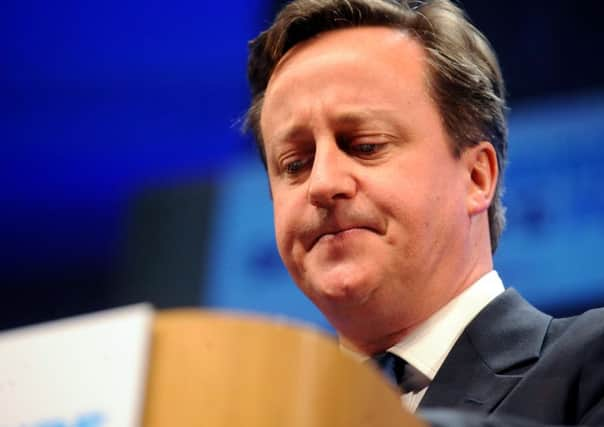Leader comment: David Cameron must be fearing the worst


PRIME Minister David Cameron might be forgiven for wondering what on earth he let himself in for when he promised a referendum on the UK’s membership of the European Union.
Mr Cameron’s motivation for calling the vote is clear – he felt the need to placate the substantial number of his own party’s members who blame the EU for all manner of ills.
Advertisement
Hide AdAdvertisement
Hide AdPerhaps, when he made his decision, the Prime Minister was confident that his preference for remaining in Europe would prove to be the popular choice. He may be less so, now.
A weekend of political intrigue saw a number of cabinet ministers formally announce that they would be campaigning against their leader in the hope of a clean break with the EU.
Away from Boris, perhaps the most significant announcement in support of Brexit came from Michael Gove, a generally loyal member of Mr Cameron’s team who’s far from the caricature of the frothing little Englander we might readily associate with anti-EU sentiment.
Certainly, the last 48 hours have seen the EU referendum campaign kick-started in dramatic style. But headlines about division and plotting do not assist voters in weighing up the pros and cons of EU membership.
It’s clear that a great many voters have yet to make up their minds on this important issue. At that heart of that indecision would appear to be the lack of substantial information being provided by both the In and Out camps.
Melodramatic language about “faceless Eurocrats” dictating UK laws and the distasteful demonisation of asylum seekers are powerful weapons in the armoury of the Out campaign. We can expect the rhetoric from that camp to become ever more heated.
The response from the In campaign will, inevitably, be less emotive and will focus on what those supporting EU membership believe to be its benefits.
Here in Scotland, we know from recent experience that facts can get lost in the gaps between arguments during a referendum campaign. It is crucial – especially for the In campaign – that this doesn’t happen in this instance.
Advertisement
Hide AdAdvertisement
Hide AdIt is a safe bet that Scotland will vote in favour of the UK staying in Europe. Polls suggest two thirds of Scots will vote In.
But – London aside – there is strong anti-EU feeling across much of England.
And those voters, in the West Country, in the Midlands, and the North, will dictate the final result.
First Minister Nicola Sturgeon continues to argue that a situation where Scots vote to remain in the EU but the UK, as a whole, chooses to leave would provide a possible trigger for a second independence referendum.
This is, to some degree, an exercise in keeping her supporters happy but there is little doubt that such a stark difference between Scots and English voters would help Ms Sturgeon’s cause.
The stakes for David Cameron’s premiership – and for the future of the United Kingdom – are now very high, indeed.
Ailing NHS needs a hand
Politicians of all parties who relentlessly claim that our National Health Service is safe only in their hands might wish to pay attention to two pieces of news carried in today’s Scotsman.
According to research carried out by The Royal College of General Practitioners
Advertisement
Hide AdAdvertisement
Hide Ad(Scotland), investment in local doctors’ surgeries has fallen by £1.6 billion over the past decade.
This is, by any measure, a huge sum of money which represents just one part of larger cuts to NHS Scotland in its entirety.
As if this startling statistic was not enough to raise concerns, we also report today that a growing number of under-pressure ambulance staff are so busy with call-outs that hygiene standards are dropping.
A new report shows that more than one in ten ambulance staff were not meeting hand hygiene compliance standards in December last year.
This raises serious and legitimate concerns about the infection of patients.
Illnesses such as C.diff and norovirus are easily passed on through physical contact. Frequent and thorough hand-washing is the most effective way of preventing contamination.
MSPs are locked in an interminable battle to be seen as the true champions of the NHS but with continuing cuts to funding having a direct impact on the quality of the service to patients, the reality is that none truly is.
The NHS has suffered neglect for too long and if the Scottish Government wants to live up to its claim to be the service’s protector, then the cuts that have stripped back GP services and led to ever-more pressure on paramedics must stop.